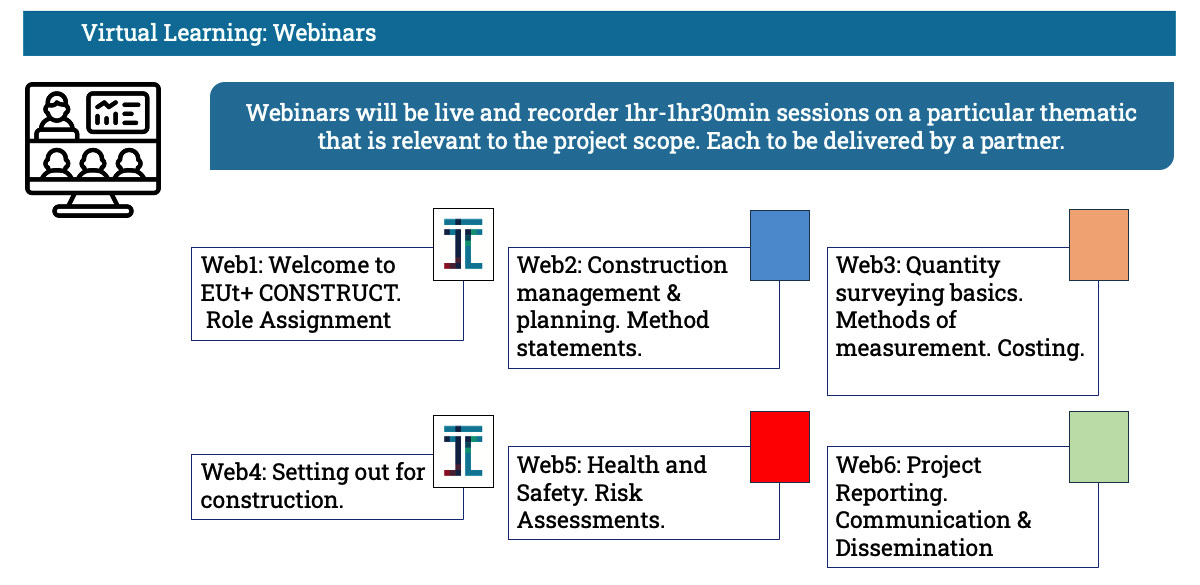eut+Construct: Learn, Lead, Legacy
Objectives
eut+Construct: Learn, Lead, Legacy is a blended intensive programme (BIP) designed for civil engineering and architecture students of the European University of Technology (Eut+) to develop hands-on skills in construction management and engineering while making a tangible impact on local communities. This initiative brings together aspiring civil engineers and architects from across Europe to plan, manage, and construct small-scale public structures, which are then donated to the community for public use. By combining theoretical knowledge with practical experience supported by our industrial partners, students enhance their leadership, teamwork, and problem-solving skills in a real-world setting. The programme fosters collaboration, sustainability, and social responsibility, empowering future engineers and architects to build not just structures, but also a lasting legacy of innovation and community engagement across Europe.
Tentative Schedule
Virtual sessions
May – June 2025
6 webinars and up to 3 catch up sessions

Physical session
June, 30th – July, 4th 2025 in Limassol, Cyprus
June, 29th:
Arrival – Welcome – CUT/Site orientation. Welcome dinner
June, 30th – July 3rd:
08:00 – 14:30: Work on site (incl. 45min lunch)
17:30-18:30 Daily debrief near accommodation
July 4th:
08:00 – 12:00 : Work Completion
12:00 – 13:30 Lunch for Project Conclusion and feedback
Learning Methods & Outcomes
Learning Methods
The programme employs a blended, experiential learning approach, integrating theoretical knowledge with hands-on practice through:
- Workshops & Online Lectures – Expert-led sessions covering construction management, sustainability, and project planning.
- Collaborative Design & Planning – Interdisciplinary teamwork on real-world construction projects.
- Hands-on Construction Activities – Practical engagement in the construction of small-scale public structures.
- Industry Engagement – Mentoring, work on site, and collaboration with industry professionals.
- Problem-Based Learning (PBL) – Addressing real-world challenges with creative and technical solutions.
- Digital Learning & Remote Collaboration – Online tools and virtual meetings for project coordination.
- Reflection & Peer Learning – Structured debriefing sessions to evaluate lessons learned.
- Public Presentation & Dissemination – Showcasing project results to stakeholders and the wider community.
Learning outcomes
- Apply principles of construction management, including project planning, scheduling, health and safety, budgeting, and resource allocation, to successfully design and execute small-scale public structures.
- Demonstrate technical proficiency in civil engineering and architecture by integrating structural detail design, material selection, and sustainable construction practices into real-world projects.
- Develop leadership, teamwork, and interdisciplinary collaboration skills by working effectively in international, cross-disciplinary teams alongside students, faculty, and industry partners.
- Evaluate and apply sustainable construction methods including nature-based solutions and ethical decision-making to ensure the environmental, economic, and social sustainability of built structures for community benefit.
- Enhance critical thinking and problem-solving skills by addressing real-world construction challenges, adapting to unforeseen project constraints, and implementing innovative engineering solutions.
- Develop communication, documentation, and public engagement skills by effectively disseminating project outcomes, presenting findings to stakeholders, and sharing best practices through reports, presentations, and digital platforms.
Assessment Methods
This BIP is accredited for 5 ECTS. Students are assessed using a combination of formative and summative evaluations, focusing on both process and outcomes:
- Project Planning Report – Evaluation of project feasibility, sustainability, and resource management.
- Technical Execution & Construction Performance – Assessment of hands-on construction skills and problem-solving abilities.
- Teamwork & Leadership Evaluation – Peer and mentor assessments of collaboration, leadership, and adaptability.
- Reflective Journal or Portfolio – Personal documentation of learning experiences, challenges, and solutions.
- Final Presentation & Dissemination – Assessment of students’ ability to communicate findings and impact to stakeholders.
- Impact & Community Engagement Report – Evaluation of how the project meets social, environmental, and technical objectives.
Credits
5 ECTS
Eligibility
B2 English
 Target Group
Target Group
This course is designed for Bachelor and Master students of :
- Civil Engineering & Architecture
Apply Here
Until : 17 March 2025 HERE






